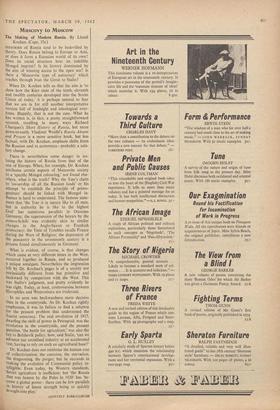The Making of Modern Russia. By Lionel Kochan. (Cape, 35s.)
HISTORIES of Russia tend to be bedevilled by theory. Does Russia belong to Europe or Asia, or does it form a Eurasian world of its own? Does its social structure bear an indelible Mongol imprint? Is its history dominated by the aim of winning access to the open sea? Is there a 'Muscovite type of autocracy' which reaches through Ivan the Great to Stalin?
When Dr. Kochan tells us that his aim is `to show how the Kiev state of the tenth, eleventh and twelfth centuries developed into the Soviet Union of today,' it is perhaps natural to fear that we are in for still another interpretative version full of hindsight and teleological over- tones. Happily, that is not the case. What he has written is, in fact, a pretty straightforward account, recalling in many ways Richard Charques's Short History of Russia, but more down-to-earth. Vladimir Weidld's Russia Absent and Present is a more sensitive book, but less factual; with Dr. Kochan, emphasis shifts from the Russian soul to economics—probably a salu- tary change.
There is nevertheless some danger in iso- lating the history of Russia from that of the rest of Europe. When, for example, Dr. Kochan attributes certain aspects of Muscovite society to a 'specific Mongol colouring,' not found else- where, what is the truth? Why the Tsar's claim to 'ownership of all the Russian lands' or his attempt 'to establish the principle of primo- geniture' should be linked with Mongol in- fluence is hard to understand. The famous state- ment that 'the Tsar is in nature like to all men, but in authority he is like to the highest God' has numerous parallels in Ottonian Germany; the supersession of the boyars by the Pomeschchiki was evidently akin to similar changes in the Anglo-Saxon or Frankish aristocracy; the Time of Troubles recalls France during the Wars of Religion; the depression of the peasantry in the seventeenth century is a process found simultaneously in Germany.
What 'is evident, of course, is that changes which came at very different times in the West, occurred together in Russia, and so produced a unique amalgam. Nevertheless the impression left by Dr. Kochan's pages is of a society not intrinsically different from but primitive and backward by comparison with the West. This was Stalin's judgment, and pretty evidently he was right. Today, at least, controversies between Slavophiles and Westernisers are irrelevant.
In no area was backwardness more decisive than in the countryside. As Dr. Kochan rightly emphasises, it was its failure to find a solution for the peasant problem that undermined the Tsarist autocracy. The real revolution of 1917, dwarfing the shift of power in Petrograd, was the revolution in the countryside, and the peasant question, 'the battle for agriculture,' was also the key to Bolshevik policy: how; said Stalin, 'can we advance our socialised industry at an accelerated rate, having to rely on such an agricultural base?'
Dr. Kochan does not minimise the human cost of collectivisation, the coercion, the starvation, the dragooning, the purges; but he succeeds in making the evolution of Communist policy in- telligible. Even today, by Western standards, Soviet agriculture is inefficient; but 'the Russia that was beaten by the Poles in 1920' has 'be- come a global power : there can be few parallels














































 Previous page
Previous page